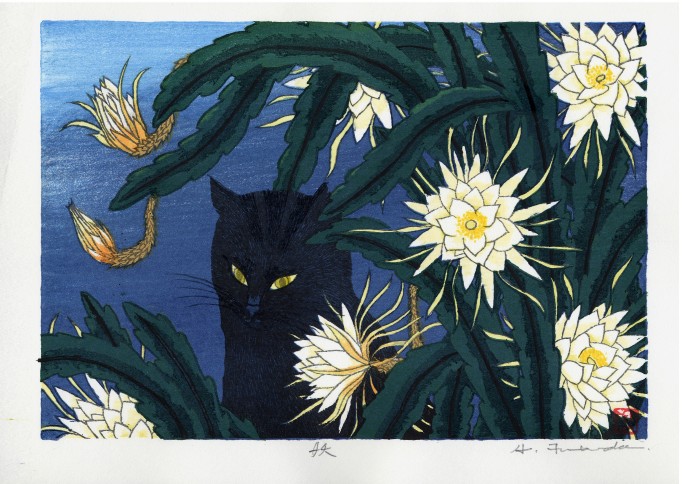Hirokazu Fukuda – Woodblock Artist YO

Japanese woodblock printing carries a long, rich history that reached its heights in the Edo period (1603 to 1867). Traditionally the art of creating a woodblock print was broken down into the following specialties*:
- First, an artist would create a design.
- From that drawing, a block copyist would create a very fine black-and-white drawing on paper.
- The print would be passed on to blockcarvers who, using chisels, would carve a series of woodblocks—first, a “key block” showing the outlines of the print, and then one block for each color to be printed – often 15 or more blocks were required.
- When the blocks were complete, printers would apply ink using brushes. Laying a sheet of paper face down on top of the block, the printer rubbed the ink onto [handmade] paper using a round, flat pad, called a “baren”.
Mr. Fukuda applied these very same techniques, with one great exception – all work was designed, hand-carved and, with the help of professionals, hand printed by the artist himself.
Print details:
- Hand-carved and hand printed from 12-15 blocks of wood
- Printed on beautiful hand-made torinokoshi paper
- Individually stamped and signed by the artist
- Limited edition first printing, with only 250 prints made
- 21cm x 19cm (8.2″ x 7.4″)
- Recommended mat border colour: white with a 2-3mm thickness.
Artist profile
Hirokazu Fukuda (1944-2004) was born and raised in the Tochigi prefecture, an area situated a little over an hour north of Tokyo. A picturesque setting, Tochigi is surrounded by mountains and hills to the east, west and north while the Kanto Plains lie to the south. It is also famous for its ancient Shinto shrines and Buddhist temples.
Hirokazu (whose real name is Hiroshi), planned to become a professional classic guitarist but suffered a hand injury at a young age. Hungering after a medium to express his creativity, he first worked with the canvas, then moved on to become a master woodblock artist.
The passing of time never really concerned Mr. Fukuda, a character trait much admired by his peers. His art collection is wonderfully expressive, very true, and seems to bask in the admiration of daily life. According to family and friends, he had always hoped that his work could “touch the heart” of those around him. Mr. Fukuda died peacefully in Tokyo in 2004.
*source: pbs.org


